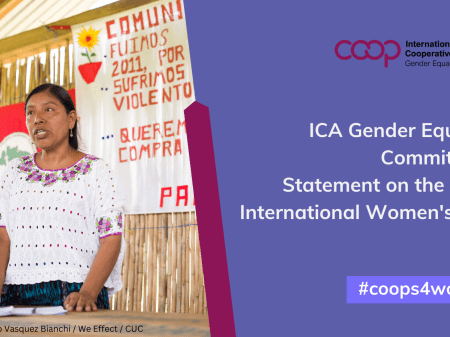
News from the International Cooperative Banking Association
The situation of co-operative banks has never been so promising in terms of recognition. In a report published in 2009, the International Labour Organization (ILO) highlights the resilience of co-operative banks during crisis as well as their stability and aversion to risks (Birchall et Ketilson, 2009)[1]. The ILO has also carried out a study on the resilience of co-operative banks, which revealed that between 2007 and 2010, their assets had increased by 10% and their customers by 14%[2].
As for the International Monetary Fund, it regards co-operative banks as actors that build a strong relationship based on trust with members, while pressuring the other banking actors to amend prices. In this way, the co-operative model helps connects with its members and helps contain prices, providing better access to financial products (Fonteyne, 2007). These organisations also see in co-operative banks important actors for economic stability.
If co-operative banks are today recognisable and identifiable, they continue to face three main challenges that threaten their governance. The first one is maintaining democracy at local level to preserve the proximity dimension that encourages members to get involved in the governance. The second challenge they face is to make sure that members have a role to play in governance without being marginalised by the employed management. Last, the third challenge concerns defining the functions of elected board members and provide them more support, especially in terms of training.
The democracy of proximity is questioned by growth groups
The second principle of the International Co-operative Alliance on the democratic power exercised by members says that “co-operatives are democratic organisations directed by their members which participate actively in the establishment of policies and the decision making. The men and women elected as members’ representatives are responsible to them. In primary co-operatives members have voting rights according to the rule – one member, one vote.[3] This principle highlights the local dimension and participation of members in the decision making, influencing the organisation in an equal manner, conforming to the rule one person, one vote”.
The growth of co-operative banks can determine an alienation of the co-operator from the final decision. His decision power diminishes as the number of members increases; there are no mechanisms like the ones in commercial enterprises registered as public limited companies, which contain “poison pills” that would enable co-operators with a long history to have more power than new co-operators. Moreover, as they grow, banking groups will gradually increase the number of decisions taken by the group.
The power tends to be transferred from local to regional level, and from regional to national level. The rule nonetheless continues to be based on the principle of subsidiarity: what cannot be technically or economically realised at organisation level goes higher to a superior level and so on.
And this principle can lead to the centralisation of power with a regular transfer of decision-making to the central level of an organisation due to issues related to cost-effectiveness, efficiency or the need to mutualise means. If that proves to be necessary, especially to reinforce the organisation in a competitive market, one needs to make sure the local dimension of its role is not lost.
This issue is crucial for co-operative banks to fulfil their role at local level, where their legitimacy is the strongest. They should not leave members who see the co-operative bank more like a plc bank and that don’t take part in the governance to be responsible for local democracy. This would inevitably diminish the number of members that take part in General Assemblies and weaken democracy. This could also impact on the quality and number of elected directors that could potentially fulfil high-level roles within the governance of a co-operative bank. At local level co-operative banks need to reinvent themselves in terms of giving real roles to locally elected members, which would be the best guaranty for an efficient governance at all levels of the co-operative.
Responsible and high-level directors
There are two main requirements for having high-level responsible directors. First of all, their position and their role must be better defined to avoid them finding themselves excluded from the governance of the organisation. This means that they need to receive help to fulfil their roles the best they can, training being crucial to achieving this.
Another important factor is, we believe, redefining the function that elected directors have within the co-operative organisations and co-operative banks. Certain deviances over the past few years have shown that elected directors have not played their counter power role, particularly regarding dangerous investments in states at risk.
We could go even further in highlighting that some deviances suggest that elected directors have not totally held the position that was theirs. It is thus crucial to clarify the role of an elected director. Objectively, he cannot enter the ensemble of operations. It’s not clear what his role would be; he comes to challenge the general manager. In return, he has to be able to position himself on two major axes of governance that are those of decision and control once the decision is being implemented.
The director needs to be a strategist and sometimes a controller as well. He represents the interests of the members, thus he needs to be sure what they want, and he also stands for democracy. He has a mandate, which means that he has needs to be accountable to his peers – the General Assembly, in exchange for the mandate he has been given.
The General Assembly, a sovereign body, has itself the same functions as the directors: it decides on directions and challenges their implementation. The director has delegated powers by members of the co-operative.
This basic element within the governance of co-operatives is nevertheless fundamental because it clarifies the roles and responsibilities within a co-operative. The elected director, the president of a co-operative bank needs to be a strategist capable of informing over the directions to be taken, he is the guarantor of decision and control and for what members are to be told.
After defining the role of the elected director, one has to ask questions about his competences. The members of the board gain access to these positions following a long involvement in the co-operative or the Co-operative Movement. This function is thus exercised after a long-term, pragmatic training. In order for directors to fulfil their mission of guiding and challenging efficiently in different circumstances, they need training courses. If some such initiatives emerge today[4], they need to be reinforced to enable more regular meetings on these issues favouring the exchange around realities that each are faced with in their organsiation or country. These mutualisations will help clarify who will be our future co-operative bank directors.
From the crisis to the revival of co-operative democracy
The crisis led to an increased awareness of the necessity to distinguish oneself and go back to the fundamentals of co-operative banks - knowing the member. “Considered to be a handicap during the years of financialisation, the member is now back on the agenda of co-operative and mutual banks, after the crisis has shaken the confidence in the banking system in general, and in the governance of establishments in particularly” (Gomez, 2013). This growing awareness lead to divided opinions and debates (Frémeaux, 2011). Some see in this new attitude a marketing campaign that aims to distinguish co-operative banks from competitors and regain their purity. Others co-operative banks rediscover a dimension that they had lost and that enables them to rebuild trust, which had been altered by the crisis and speculative investments that had drifted away from the interests of members.
The recovery will only happen by reviving the liaison with members, regaining the proximity of co-operative banks and co-operatives overall, which is the foundation of their legitimacy. Being closer to the members, their needs, their expectations and their vote. Those organisations rediscover a part of their identity and manage to reacquire the interest of the individuals. A bank that belongs to its customers gives them the chance to play a role in their bank. Even though the rules and professionalisation require a greater input from employees, these organisations give individuals the opportunity to get involved in collective projects. It is thus astonishing that at a time of what is now on known as the “collaborative revolution”, through Crowdfunding, the direct appeal to the public or Wikipedia, that co-operative banks stayed apart even though this form of co-operation corresponds to a large extent to the co-operative identity (Juvin, 2013).
If one element is to hold on to social economy, the collective administration of a project is a positive thing, which causes us to highlight how the return of democracy within the economy can bring advantages. If it’s not perfect, it remains the mechanism of protection of the interest of each and the expression of every one.
[1] Birchall J. et Ketilson L. H., 2009, Resilience of the cooperative business model in time of crisis, International Labour Organization.
[2] "Coopératives financières: un pari sûr en période de crise", analyse du 12 avril 2013, site Internet du BIT, in http://www.ilo.org/global/about-the-ilo/newsroom/news/WCMS_210354/lang--fr/index.htm (Page consultée le 26 février 2014).
[3] International cooperative alliance, cooperative identity, values and principles, in http://ica.coop/en/what-co-op/co-operative-identity-values-principles
[4] Master of Management, Co-operatives and Credit Unions de l'université Saint Mary's et de l'école de management Sobey au Canada, ou le Master Gouvernance Mutualiste de l'Universite de Versailles-Saint Quentin en France.




